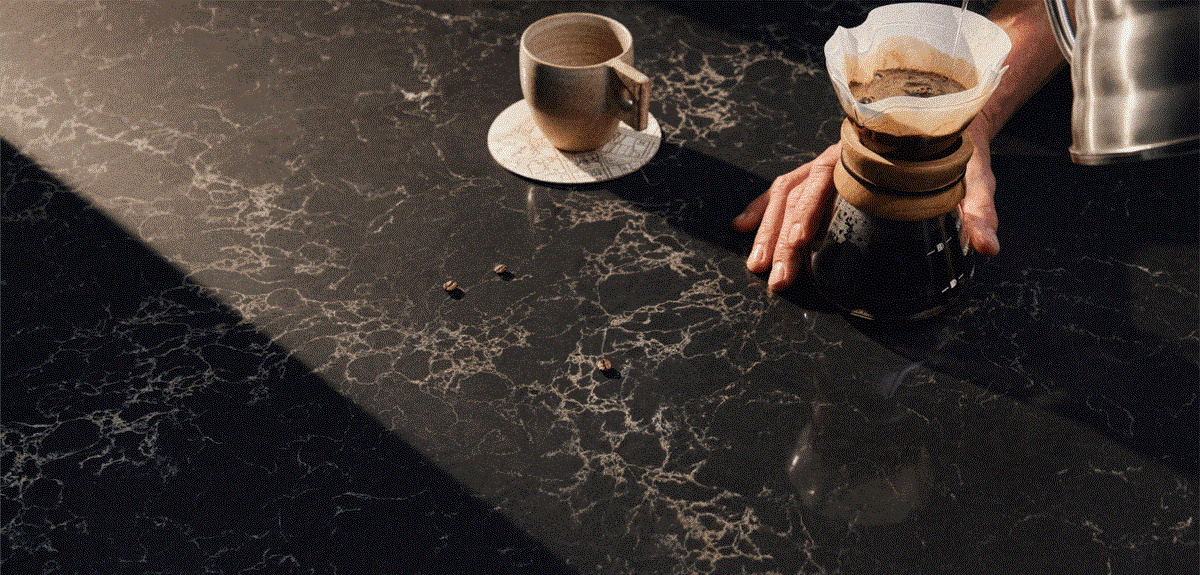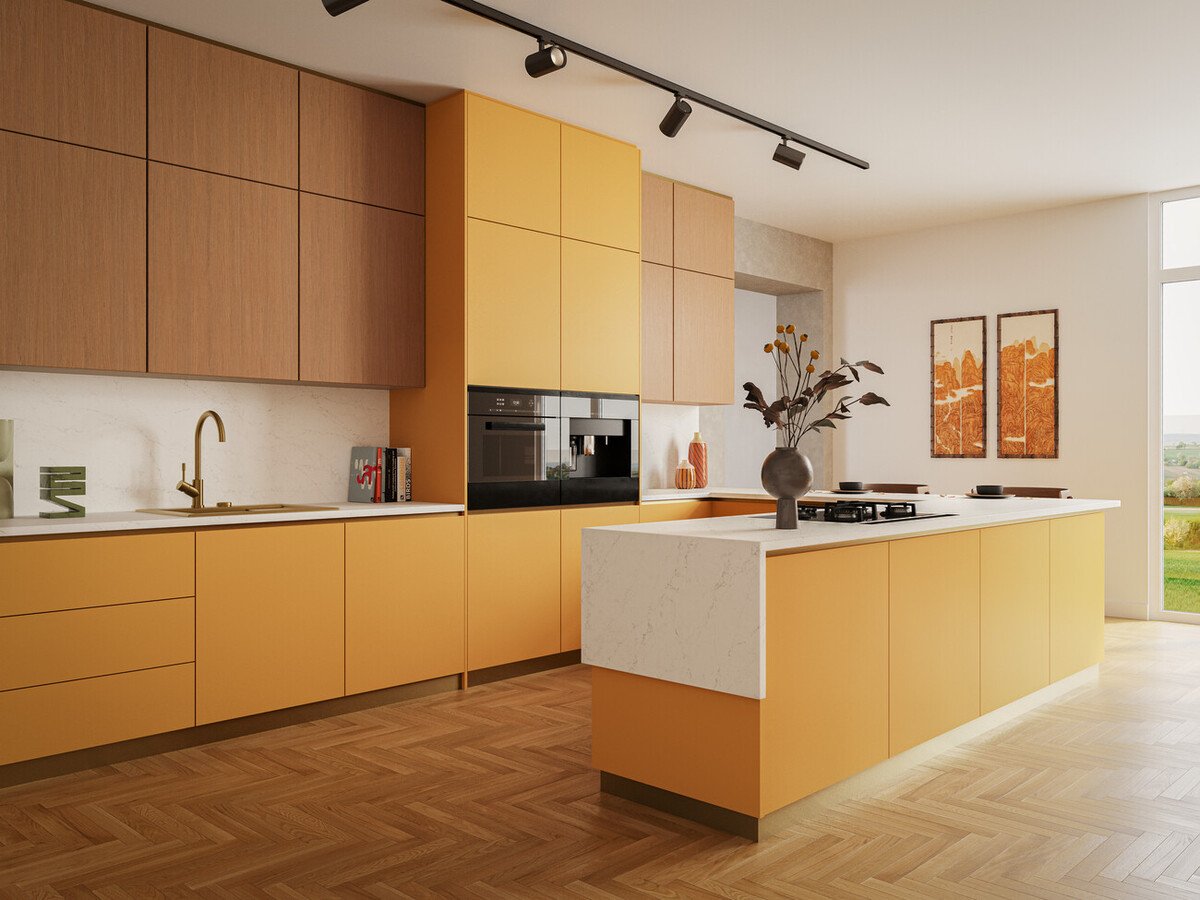
Whether you're considering a new kitchen installation or already enjoying a Caesarstone Mineral surface, this guide covers everything you need to know. From heat resistance and finish options to cleaning tips and cost estimates, find answers to common questions and discover how Caesarstone Mineral worktops combine durability, style and sustainability for a beautiful and practical kitchen.
Can you put hot pans on mineral worktops?
While Caesarstone Mineral surfaces are designed for heat resistance, we recommend always using trivets or heat pads for hot pans, particularly if they have just come out of the oven or off of the hob. This helps eliminate the danger of thermal shock which can damage your mineral worktops.
What are the different finishes of Caesarstone Mineral surfaces?
Caesarstone Mineral worktops are available in various finishes, including polished, honed and rough. A polished finish has a high-gloss smoothness that reflects light, making the room feel larger and more luxurious. Honed is a matte finish that, with its smooth touch and gentle aesthetic, adds a delicate sophistication to the room. Rough, as you might expect, has a coarse finish that comes from advanced technologies for visual depth with an enticing tactile experience – that’s still smooth enough for easy cleaning!
How do I get a quote for a Caesarstone Mineral worktop?
Simply visit our quotes page to find a recommended fabricator near you. You can provide details about your project, such as which worktops you’re interested in, your target installation date and a project description, as well as any project plans.
How do Caesarstone mineral surfaces compare with other materials?
Mineral worktops are highly durable and resistant to scratches, chips and heat, making them a strong alternative to materials like laminate or wood, which can be prone to damage over time. Mineral worktops are also non-porous (unlike granite or marble), meaning they resist stains and are more hygienic and easier to maintain, needing only mild soap and water for cleaning. In contrast, marble can require special cleaners and stainless steel can show smudges and fingerprints more easily.
While mineral worktops are generally more affordable than high-end natural stone (like marble) and on par with quartz, they can be more expensive than laminate or tile countertops, but are engineered for greater longevity, with Caesarstone Mineral worktops covered by a lifetime residential warranty.
How do I clean mineral worktops?
You can clean Caesarstone Mineral surfaces with just a soft cloth, water and some mild soap, they’re really that easy to keep clean! We recommend you don’t use any harsh chemicals as these can affect the finish.
What are the benefits of a Caesarstone mineral worktop?
Caesarstone mineral worktops are naturally non-porous which means they are incredibly resilient to staining and imperfections, providing you with not only long-lasting quality but a more hygienic surface that is easy to clean. Their natural impermeability inhibits the growth of bacteria, mould and mildew. Mineral worktops are also harder, stronger and safer than other natural stone worktops, meaning they are impressively resistant to scratches, scrapes and scuffs.
How much does a Caesarstone Mineral worktop cost?
The cost of a Caesarstone Mineral worktop varies depending on the finish, colour, thickness, and installation requirements, so it’s best to get a quote for your specific requirements from our recommended fabricators who will be happy to assist you in your project.
What is the difference between mineral and quartz worktops?
Both quartz and mineral worktops are highly durable, non-porous and resistant to stains, scratches, and heat, but quartz worktops are engineered surfaces made from up to 95% natural quartz crystals, combined with resins and pigments. Mineral worktops are also engineered surfaces made from a blend of natural minerals, increased recycled material compared to quartz surfaces, and, of course, pigments to enhance the surface’s characteristics.
Can you cut directly on mineral worktops?
Although mineral worktops are durable and scratch-resistant, we don’t recommend cutting directly on Caesarstone Mineral surfaces. Using a cutting board helps prevent potential damage and extends the lifespan of your worktop.
How do I remove stains from Caesarstone Mineral worktops?
For everyday stains, use a mild detergent and water. For tougher stains, a non-abrasive household cleaner works well, or you can use baking soda and water or a vinegar and water solution. Avoid using bleach or harsh chemicals that could damage the surface. Take a look at our care and maintenance guide here.
What is the most scratch-resistant kitchen worktop?
Caesarstone Mineral worktops, alongside Caesarstone Quartz and Caesarstone Porcelain worktop surfaces, are among the most scratch-resistant materials available. However, no surface is entirely scratch-proof, so we always recommend using cutting boards to protect them from damage.
 Caesarstone 5140 Dreamy Carrera
Caesarstone 5140 Dreamy Carrera
What colours and patterns are available in Caesarstone’s Mineral collection?
Caesarstone’s mineral collection offers a broad palette of colours, including natural tones like whites, creams, greys, and blacks, as well as earthy hues. The worktops are available in intricate patterns that reflect natural stone textures as well as more solid colours. Some worktops are finished to evoke the look and feel of poured concretes while others have the look of natural stones like marble, granite or limestone.
How does a Caesarstone Mineral worktop compare in terms of sturdiness and durability to other materials like granite or quartz?
Caesarstone Mineral surfaces are fantastically durable, similar to quartz worktops, in that both are highly resistant to cracks, chips and scratches. They are also non-porous, unlike granite, making them easier to clean and maintain. Granite, as a natural rock, can chip and emit small amounts of radon; it is also porous and is therefore not as easy to keep clean as mineral worktops. Natural stone worktops like granite or marble also need regular sealing to maximise longevity, adding cost and hassle, whilst Caesarstone Mineral or quartz surfaces require no sealing.
Are the materials used in Caesarstone’s Mineral worktop surfaces environmentally friendly?
Yes, Caesarstone is committed to sustainability. We use eco-friendly production methods, including recycled materials, slashing GHG emissions, and working with similarly responsible partners, to minimise our environmental impact. We are proud of our range of sustainability standards and certifications.

.jpg)

